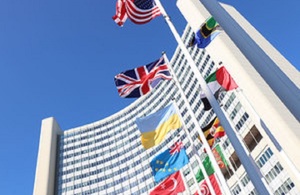UK statement on the "Report of the Legal Sub-Committee" at COPUOS
Delivered by a member of the UK Delegation to the UN Committee on the Peaceful Uses of Outer Space (COPUOS 65) in June 2022.

UK Mission Vienna
Chair, distinguished delegates,
The United Kingdom would like to extend its thanks to COPUOS delegates and UNOOSA who contributed to the success of the Legal Subcommittee this year. We would also like to thank the chair, Nomfuneko Majaja for their hard work in presiding over the sessions.
Chair,
The United Kingdom was pleased to take part in discussions resulting in the agreement of the workplan and mandate of the working group on space resources. The United Kingdom believes this is a crucial next step in working multilaterally on the critical issue of the utilisation of space resources and is looking forward to working with other delegates to advance this topic in the working group.
The United Kingdom would like to commend the efforts and expertise of the Chair Andrzej Misztal and the Vice Chair Steven Freeland of the space resources working group for their hard work and excellent leadership of the group.
As expressed previously, our view is that it is not the role of COPUOS to consider the topics of radio waves or geostationary orbit slots as these fall under the remit of the International Telecommunications Union (ITU).
The United Kingdom is a proud signatory of both the Outer Space Treaty, as the foundation of the global governance of outer space, and the Artemis Accords because we fully recognise the opportunity that utilising resources in space affords us and the wider international community.
In relation to our national legislation, the United Kingdom’s Space Industry Act became law in 2018 and the regulations underpinning the Act, came into force in July 2021. These pieces of legislation make provision to regulate all spaceflight activities carried out from the UK including both sub-orbital and space launches.
In developing the legislation to regulate these activities, the UK thought carefully about the definitions contained within our legislation and policy – looking to industry, legal frameworks and policies within other Member States, the UN treaties and agreed international guidelines.
The approach the UK has taken to regulating launch to orbit and sub-orbital launches from the UK is to look at the purpose and function of the mission. It is the UK view, that defining where space begins is not necessary to be able to regulate these activities and is not required when considering future space traffic management approaches.
The UK is committed to the sustainable use of space for all and welcomes discussion on how we can work together to tackle the issue of space debris. We recognise our responsibility in this area and endeavour to play an active role in developing international best practice for the long-term sustainability of outer space.
Utilising the high-level framework provided by our Space Industry Act, the UK is developing a regulatory framework which will facilitate active debris removal missions which will help to clean up the orbital environment to ensure the future use of space for all.
Furthermore, the UK is taking measures to incorporate internationally recognised guidelines and standards relating to space debris into national legislation.
The UK recently fully implemented its comprehensive policy on the registration of space objects. We believe good registration practice is the foundation for enabling active debris removal and in-orbit servicing missions, and that transparency and international collaboration will be essential to the success of these missions.
The UK welcomes the views of all Members at COPUOS and recognises the importance of contributions from international non-governmental organisations, who can provide valuable insights on the topics that we discuss here, across the subcommittees and this plenary event.
The United Kingdom would like to commend the International Institute for Space Law (IISL) and European Centre for Space Law (ECSL) on their space symposium on the “National laws and regulations to ensure space sustainability” which provided valuable input to the work of the Subcommittee.
Finally, the United Kingdom values the important work undertaken at the Legal Subcommittee and we look forward to working closely as a committed member of the Committee, building consensus to make significant progress on the peaceful uses of outer space.
Thank you for your kind attention.